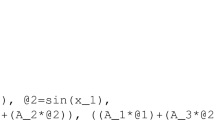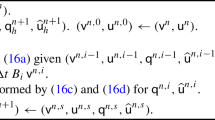Abstract
In this paper, adaptive virtual element method (VEM) approximation of optimal control problem governed by Stokes equations with control constraints is discussed. The virtual element discrete scheme of the optimal control problem is constructed by polynomial projections and variational discretization of the control variable. Based on the a posteriori error estimates of VEM for Stokes equations and approximated error equivalence between the solutions of the optimal control problem and the solutions of the state and adjoint equations, we build up upper and lower bounds for the a posteriori error estimates of the optimal control problem. It proves that the a posteriori error indicator is reliable and efficient. The theoretical findings are illustrated by the numerical experiments.












Similar content being viewed by others
Data Availability
Enquiries about data availability should be directed to the authors.
References
Allendes, A., Fuica, F., Otarola, E., Quero, D.: An adaptive FEM for the pointwise tracking optimal control problem of the Stokes equations. SIAM J. Sci. Comput. 41(5), A2967–A2998 (2019)
Allendes, A., Fuica, F., Otarola, E., Quero, D.: A posteriori error estimates for a distributed optimal control problem of the stationary Navier–Stokes equations. SIAM J. Control. Optim. 59(4), 2898–2923 (2021)
Becker, R., Kapp, R., Rannacher, R.: Adaptive finite element methods for optimal control of partial differential equations: basic concept. SIAM J. Control. Optim. 39(1), 113–132 (2000)
Beirão da Veiga, L., Brezzi, F., Cangiani, A., Manzini, G., Marini, L.D., Russo, A.: Basic principles of virtual element methods. Math. Models Methods Appl. Sci. 23(1), 199–214 (2013)
Beirão da Veiga, L., Brezzi, F., Marini, L.D.: Virtual elements for linear elasticity problems. SIAM J. Numer. Anal. 51(2), 794–812 (2013)
Beirão da Veiga, L., Brezzi, F., Marini, L.D., Russo, A.: Virtual element method for general second order elliptic problems on polygonal meshes. Math. Models Methods Appl. Sci. 26(4), 729–750 (2016)
Beirão da Veiga, L., Lovadina, C., Vacca, G.: Divergence free virtual elements for the Stokes problem on polygonal meshes. ESAIM Math. Model. Numer. Anal. 51(2), 509–535 (2017)
Beirão da Veiga, L., Lovadina, C., Vacca, G.: Virtual elements for the Navier–Stokes problem on polygonal meshes. SIAM J. Numer. Anal. 56(3), 1210–1242 (2018)
Boffi, D., Brezzi, F., Fortin, M.: Mixed Finite Element Methods and Applications. Springer, Berlin (2013)
Braack, M., Richter, T.: Solutions of 3D Navier–Stokes benchmark problems with adaptive finite elements. Comput. Fluids 35(4), 372–392 (2006)
Brenne, S.C., Guan, Q.G., Sung, L.Y.: Some estimates for virtual element methods. Comput. Methods Appl. Math. 17(4), 553–574 (2017)
Brezzi, F., Marini, L.D.: Virtual element methods for plate bending problems. Comput. Methods Appl. Mech. Eng. 253, 455–462 (2013)
Cangiani, A., Georgoulis, E.H., Pryer, T., Sutton, O.J.: A posteriori error estimates for the virtual element method. Numer. Math. 137(4), 857–893 (2017)
Canuto, C., Rosso, D.: A posteriori error analysis and adaptivity for a VEM discretization of the Navier–Stokes equations (2022). Preprint at https://doi.org/10.48550/arXiv.2212.14414
Chen, L., Huang, J.G.: Some error analysis on virtual element methods. Calcolo 55(1), 5 (2018)
de los Reyes, J.C., Kunisch, K.: A semi-smooth Newton method for control constrained boundary optimal control of the Navier–Stokes equations. Nonlinear Anal. 62(7), 1289–1316 (2005)
Deckelnick, K., Hinze, M.: Semidiscretization and error estimates for distributed control of the instationary Navier–Stokes equations. Numer. Math. 97(2), 297–320 (2004)
Hinze, M.: A variational discretization concept in control constrained optimization: the linear-quadratic case. Comput. Optim. Appl. 30(1), 45–61 (2005)
Liu, W.B., Yan, N.N.: A posteriori error estimates for control problems governed by Stokes equations. SIAM J. Numer. Anal. 40(5), 1850–1869 (2002)
Liu, H.P., Yan, N.N.: Recovery type superconvergence and a posteriori error estimates for control problems governed by Stokes equations. J. Comput. Appl. Math. 209(2), 187–207 (2007)
Liu, W.B., Yan, N.N.: Adaptive Finite Element Methods for Optimal Control Governed by PDEs. Science Press, Beijing (2008)
Mora, D., Rivera, G., Rodríguez, R.: A posteriori error estimates for a virtual element method for the Steklov eigenvalue problem. Comput. Math. Appl. 74(9), 2172–2190 (2017)
Nicaise, S., Sirch, D.: Optimal control of the Stokes equations: conforming and non-conforming finite element methods under reduced regularity. Comput. Optim. Appl. 49(3), 567–600 (2011)
Niu, H.F., Yang, D.P.: Finite element analysis of optimal control problem governed by Stokes equations with \({L}^2\)-norm state-constraints. J. Comput. Math. 29(5), 589–604 (2011)
Niu, H.F., Yuan, L., Yang, D.P.: Adaptive finite element method for an optimal control problem of Stokes flow with \({L}^2\)-norm state constraint. SIAM J. Numer. Anal. 69(3), 534–549 (2012)
Rösch, A., Vexler, B.: Optimal control of the Stokes equations, a priori error analysis for finite element discretization with postprocessing. SIAM J. Numer. Anal. 44(5), 1903–1920 (2006)
Tröltzsch, F., Wachsmuth, D.: Second-order sufficient optimality conditions for the optimal control of Navier–Stokes equations. Nonlinear Anal. 12(1), 93–119 (2006)
Vacca, G.: An \({H}^1\)-conforming virtual element for Darcy and Brinkman equations. Math. Models Methods Appl. Sci. 28(1), 159–194 (2018)
Verfürth, R.: A posteriori error estimators for the Stokes equations. Numer. Math. 55(3), 309–325 (1989)
Wang, Q.M., Zhou, Z.J.: Adaptive virtual element method for optimal control problem governed by general elliptic equation. J. Sci. Comput. 88(1), 14 (2021)
Wang, Q.M., Zhou, Z.J.: A priori and a posteriori error analysis for virtual element discretization of elliptic optimal control problem. Numer. Algor. 90, 989–1015 (2022)
Wang, J.P., Wang, Y.Q., Ye, X.: A posteriori error estimation for an interior penalty type method employing H(div) elements for the Stokes equations. SIAM J. Sci. Comput. 33(1), 131–152 (2011)
Wang, G., Wang, Y., He, Y.N.: A posteriori error estimates for the virtual element method for the Stokes problem. J. Sci. Comput. 84(2), 37 (2020)
Funding
The research was supported by National Natural Science Foundation of China (No. 11971276, 12171287).
Author information
Authors and Affiliations
Corresponding author
Ethics declarations
Conflict of interest
The authors declare that they have no conflict of interest.
Additional information
Publisher's Note
Springer Nature remains neutral with regard to jurisdictional claims in published maps and institutional affiliations.
Rights and permissions
Springer Nature or its licensor (e.g. a society or other partner) holds exclusive rights to this article under a publishing agreement with the author(s) or other rightsholder(s); author self-archiving of the accepted manuscript version of this article is solely governed by the terms of such publishing agreement and applicable law.
About this article
Cite this article
Li, Y., Wang, Q. & Zhou, Z. Adaptive Virtual Element Method for Optimal Control Problem Governed by Stokes Equations. J Sci Comput 97, 63 (2023). https://doi.org/10.1007/s10915-023-02377-1
Received:
Revised:
Accepted:
Published:
DOI: https://doi.org/10.1007/s10915-023-02377-1
Keywords
- Virtual element method
- Optimal control problem
- Stokes equations
- A posteriori error analysis
- Adaptive VEM algorithm




